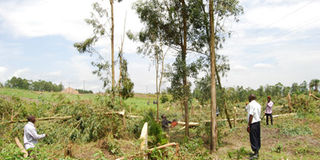Wetland restoration: Nema cuts down trees, plantations

At work. NEMA officials cut down eucalyptus trees at River Rwizi banks in Bubare Sub-county, Mbarara District last week. PHOTO BY FELIX AINEBYOONA
What you need to know:
- The senior environment officer for Kyenjojo District, Mr Julius Bigabwa, told Daily Monitor that they have 183 wetlands in the district of which 80 per cent have been highly encroached.
- The cost. According to the Uganda Wetlands Atlas, wetland destruction costs Uganda nearly Shs2 billion annually, and contamination of water resources, which is partly caused by reduced buffering capacity of wetlands near open water bodies, costs the country nearly Shs38 billion annually.
MBARARA/FORT PORTAL. In a bid to save River Rwizi, officials from the National Environment Management Authority (Nema) have cut down hundreds of acres of eucalyptus trees and banana plantations that were in wetlands of Nyakayojo and Bubaare sub-counties.
Mr Herbert Nabaasa, the senior district support officer in charge of fragile eco system in Western Uganda, said on Tuesday that Nema had destroyed plantations and forests covering 12 kilometres.
The restoration of the wetlands in the two sub-counties kicked off in last month. Mr Nabasa said as an environment watch-dog, they are targeting to restore all wetlands and river catchments in Mbarara, Isingiro, Kiruhura, Sheema, Buhweju, Ntungamo, Lyantonde and Rakai districts.
“River Rwizi is a major water source for five districts. It starts from Buhweju through Mbarara, Isingiro and also parts of Ntungamo. Unfortunately, the river is drying up because of human activities,” Mr Nabaasa said.
Drainage channels
He added that they have also closed up all the drainage channels dug by residents to drain water in a bid to create gardens and farms.
“We are targeting the entire catchment area. This therefore serves as a warning to all people, we have started destroying structures and nobody should return to those same places,” Mr Nabaasa warned.
He added: “We served them warning notices asking them to leave the catchment areas. In case they defy, they will pay all the restoration costs and be imprisoned.”
According to authorities, government earmarked Shs200m to be spent every year on the restoration of River Rwizi.
Initiative
The team, according to Mr Nabaasa has also evicted several people from wetlands in Kiruhura and Buhweju districts since October last year.
The environment authorities have also planted trees in the 200 and 100 meters buffer zone for lakes and rivers respectively.
The Mbarara District speaker, Mr Balam Ndyaguma, on Wednesday said Nema should be vigilant and always carry out spot checks to ensure that the residents don’t return to the prohibited areas.
“The problem I have with Nema is that they come, restore the wetland systems but they do not follow up. This encourages people to go back to the catchment areas,” Mr Ndyanguma said.
He added: “I think they should start forming local environment protection committees to give them feedback and also help save government funds,’’
He advised the environment authority to work closely with the district local leadership while implementing their initiatives for proper management.
According to Mr Nabaasa, there are environmental protection committees which act as whistle blowers in Kiruhura and Buhweju districts.
Rwenzori sub-region
In Rwenzori sub-region, a similar exercise by Nema is being carried out to curb the rampant encroachment of forests and wetlands.
Last week, NEMA issued a 21-day ultimatum to more than 300 residents to vacate wetlands.
The intervention follows a district council resolution to have encroachers evicted after it emerged that the area was losing its natural vegetation to human activities.
The Resident District Commissioner (RDC), Mr Apollo Bwebale, early last month petitioned the NEMA executive director to offer support on the same.
The senior environment officer for Kyenjojo District, Mr Julius Bigabwa, told Daily Monitor that they have 183 wetlands in the district of which 80 per cent have been highly encroached.




